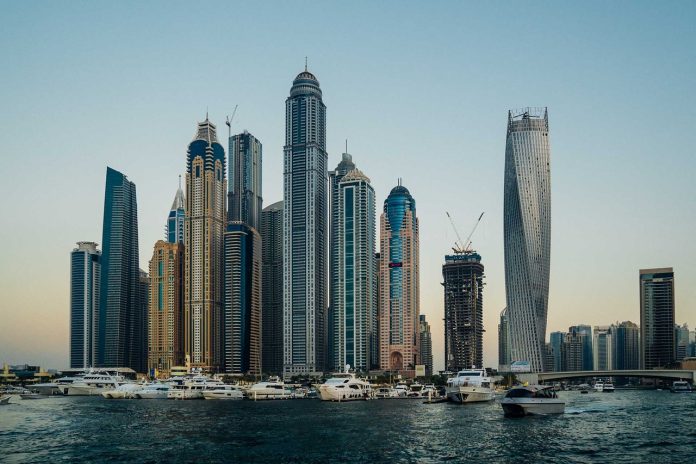Gary Knight, below, CEO at WOLF, looks at the opportunities that are offered in the Middle East and says why it’s a market for businesses to consider
 The Middle East has certainly taken centre stage over the past year. With the World Cup hosted in Qatar, and two notable visits by Western leaders, Rishi Sunak and Joe Biden, who discussed collaboration opportunities with His Highness Sheikh Mohammed bin Salman, the Crown Prince and Prime Minister of the Kingdom of Saudi Arabia. Saudi Arabia’s four new economic zones in Riyadh, Jazan, Ras Al-Khair, and King Abdullah Economic City are also attracting attention. Offering competitive corporate tax rates, exemption from import customs charges, 100% foreign enterprise ownership and the flexibility to hire top global talent.
The Middle East has certainly taken centre stage over the past year. With the World Cup hosted in Qatar, and two notable visits by Western leaders, Rishi Sunak and Joe Biden, who discussed collaboration opportunities with His Highness Sheikh Mohammed bin Salman, the Crown Prince and Prime Minister of the Kingdom of Saudi Arabia. Saudi Arabia’s four new economic zones in Riyadh, Jazan, Ras Al-Khair, and King Abdullah Economic City are also attracting attention. Offering competitive corporate tax rates, exemption from import customs charges, 100% foreign enterprise ownership and the flexibility to hire top global talent.
As traditional growth markets in the West face financial uncertainty, the Middle East as a business opportunity is certainly one to watch. According to a report released in 2021 by the UK’s Department for International Trade, more than 6,000 British companies have already registered in the UAE.
The trends driving opportunities in the Middle East
Driven by Vision 2030, a unique transformative economic and social reform blueprint, hoping to open Saudi Arabia up to the world, commitments are being made by several countries in the region to diversify and invest in new sectors, outside of oil.
The Middle East is also quick to adapt to changes and will introduce new legal frameworks and authorities to help expedite areas of growth. The region has a thriving, young (a third of the population is aged between 15-29), educated, technologically minded population that wants to spend.
Where are the opportunities?
Sectors that are open to opportunities for investment and growth, range from technology to renewable energy, and from commercial real estate to transport. Also, new private equity opportunities are presenting themselves with investments focused on cybersecurity, healthcare, industrials, and consumer goods and services.
Renewables
Green energy is a focus. TAQA, the Abu Dhabi National Energy Company, is establishing a new framework for green finance, facilitating the issuance of sustainable financial instruments such as green bonds, loans, and other debt instruments. It intends to use the funds to finance eligible green projects, including renewable energy, energy efficiency, sustainable water and wastewater management, clean transportation, and terrestrial and aquatic biodiversity.
Commercial real estate
Commercial real estate demand continues, with investment chiefly driven by banking and financial services, technology and fintech. Also, an e-commerce boom during the pandemic continues to fuel demand for quality warehouses, as well as office space in the UAE and Saudi Arabia benefiting from strong economic growth.
Technology
Mobile internet usage highlights the increasing demand for digital products and services in the region; the number of users reached over 300 million in 2021, with predictions being reported that it would reach 50% of the population by the end of 2022.
The UAE, Saudi Arabia, and Qatar will also be the first to adopt 5G in the Middle East, with the UAE planning 5G coverage in 90% of the country by 2023.
Meanwhile, Saudi Arabia aims to be the leading hub of technology in the region, investing in digital infrastructure, such as data centres, metaverse infrastructure and fibre optic cables, creating exciting opportunities for businesses.
This landscape lends itself to digital entertainment, e-commerce, fintech, and telecommunication services – and WOLF as a technology business employs an increasing range of talented professionals in the Middle East. The company runs an app for Arabic users, offering an audio, virtual world of entertaining communities. The technological advances and digital infrastructure investment in the gaming market gives an expected growth rate of 13.88% during 2022-2027.
Aerospace and transport
With gender equality evolving in the region, and women given more freedom, there has been a surge in demand for luxury cars and the UAE is looking to establish itself as a manufacturing hub for luxury sports cars. There is also a focus on the electric vehicle market, with a commitment of 30% electric vehicles by 2030 in Riyadh. Civil aerospace is enjoying a resurgence, with high military expenditure expected to continue.
What are the challenges and how to overcome them?
There are many factors to consider when opening a business in the Middle East. Even as a region that is becoming ever more international, getting started can be complex.
Understanding and respecting social norms and cultures is paramount and accepting that things can work at a different pace; for example there are 14 public holidays in the Middle East, and the holy month of Ramadan to celebrate, all impacting timescales. Plus, the working week is typically not the traditional Monday to Friday.
Grasping the tax implications for the company and its employees is essential, including the nuances of what tax is paid and where, before creating a business in the region. Also, a local sponsor, partner or adviser is crucial, but can be tricky to find. And having sufficient funds in the country is also essential, as are employees’ work visas and permits, and advice on employment laws. Consideration around recruitment processes and training opportunities is required, especially if recruiting from the local talent pool; staff with a knowledge of the local language then becomes a must.
The Middle East operates under its own rules and regulations, but more businesses are recognising the opportunities and managing to set up and grow successfully. Information and support is available to help with business creation, and thanks to recent reforms and an eagerness to attract international investment, things should only get easier.


